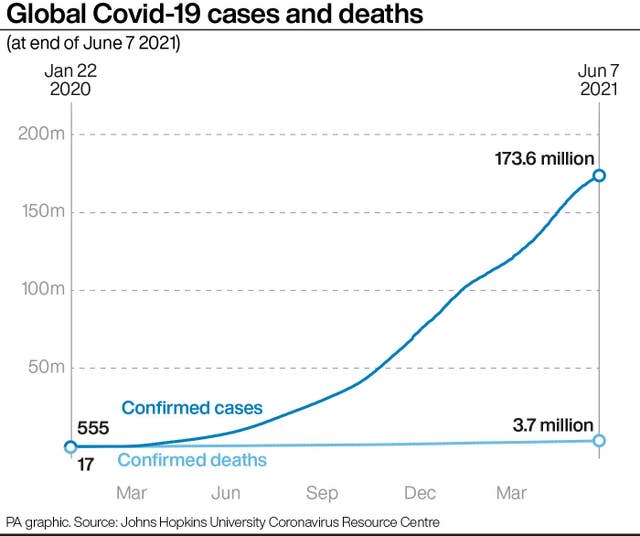Johnson urged to use G7 for ‘Churchillian moment’ to end pandemic
Boris Johnson has been urged to use his chairmanship of the G7 meeting to pull off a “Churchillian moment” to lead the world out of the worst crisis in a century, a health expert has said.
Global health leaders said that G7 leaders must take swift action to deal with the “shocking lack of access” to Covid-19 vaccines around the world.
And the Prime Minister in particular can show leadership “as was done during the World War” to help end the pandemic, one expert said.

Meanwhile, leaders were urged to deliver on promises “immediately” to help vaccinate vulnerable people in low and middle-income countries.
And political leaders have been told not to make promises that they cannot commit to and give false hope to countries in desperate need of vaccines.
Leaders must use the meeting “for the good of humanity” because if not it would just be a “club”, another expert said.
Speaking at a Wellcome summit on what is needed from the G7 to end the pandemic, Dr Ayoade Alakija, co-chair of the Africa Union’s Africa Vaccine Delivery Alliance, said: “Boris Johnson, who is chairing or leading the G7 this year, this could very well be his Churchillian moment.
“For the UK, which has had some relatively poor press in the last year, this is a moment to grab with both hands and show some significant leadership, as was done during the World War, and help pull the world out of one of the worst crises that we have seen in 100 years.”
#COVAX needs 1 billion vaccine doses from G7 countries.
Here’s how many they have so far ⬇️ pic.twitter.com/og0c6PMfsV
— Wellcome (@wellcometrust) June 8, 2021
At a separate Chatham House briefing on the same issue, Dr Mike Ryan, who leads the World Health Organisation’s emergencies programme, said: “Donating vaccine now is great, delivering vaccine late is bad. We need donations and delivery now – the gap is now.
“There are health workers today, going into Covid wards, intensive care units, intubating patients, who are not vaccinated against SarS-Cov-2 – we are literally asking health workers to risk their lives when there is vaccine to vaccinate.
“And that is one of the greatest inequities you can have in medicine or science.”
On inequalities, he added: “This pandemic has ripped away the bandages from some very old wounds in our society itself.”
He said: “It has clearly exposed underlying vulnerabilities, underlying frailties, underlying inequities – they can’t be dealt with this weekend at the G7 leaders’ meeting, they will need to be dealt with over the long run.
“What we can deal with this weekend is the shocking lack of access to vaccines all around the world, that’s a decision we can make. That’s a promise we can make.”
But he urged leaders not to make promises they cannot deliver, adding: “Do not create hope without delivering, it is really important that the promises that are made this week are kept. And kept on time.”
On the meeting he added: “What we need is the G7 bringing together their political, their financial and their science muscle, and showing what it means to be a leader in the world.
“What is G7? It’s about leadership and saying, we are the most richest, most powerful countries in the world. Well that’s not just a badge of honour – with that comes responsibility, with that comes a natural leadership role, and that comes with accountability.
“There’s no written rules, but that’s what we all looked at the G7 for, to use that power and to use those finances and to use those influences for the good of humanity.
“Why else have the G7? Is it just a club so that seven get more powerful, or is it principally to come together and ensure we find solutions for the world, by bringing the seven most powerful nations together to discuss such important issues.”
Meanwhile Alex Harris, associate director of government relations at Wellcome, said: “Inequitable access to these tools is extending the pandemic and continuing to devastate lives and livelihoods.
“Sadly, it’s expected soon that the death toll this year to date will overtake the entirety of last year.
“Rich governments, those in the G7, haven’t entirely understood that it’s in their own best interest – not just morally or ethically the right thing to do – to reach the most vulnerable everywhere, as soon as possible.
“To do that, our view at Wellcome is that sharing vaccines is in the best interest of every country.
“That way, the sooner we can end the pandemic, rebuild our economies, reopen societies and end this cycle of lockdowns and new variants.”


